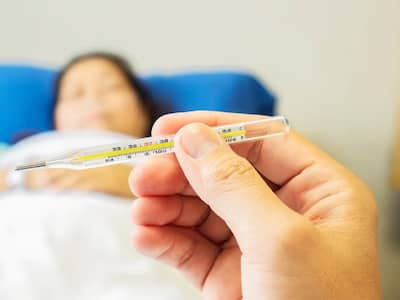
Consumption of impure drinking water is one of the primary triggers for waterborne diseases. Here are some cautionary steps you can take to prevent water-borne diseases this monsoon.
With the arrival of the monsoon season, India’s terrain has been blessed with revitalizing rains; however, it has also ushered in an uninvited phenomenon – a notable increase in water-borne diseases. While water undoubtedly sustains life, it can paradoxically serve as a cause for ailments when contaminated. Since the commencement of the monsoon, there has been a notable surge in instances of diseases like typhoid and hepatitis. Medical facilities have been inundated with an influx of patients grappling with these conditions. In such a scenario, it becomes absolutely essential for individuals to adopt adequate precautions in order to shield themselves from these health risks.
As heavy rains continue to lash several parts of India, Prof (Dr) Bhabani Prasad Chakravarty, Senior Consultant, Internal Medicine and Medical Director, Health City Hospital, Guwahati, warns of the risk of five potentially deadly monsoon-related water-borne diseases, as well as shares prevention strategies.
What’s causing water-borne diseases?
One of the primary triggers for waterborne diseases stems from the consumption of impure drinking water through various edibles and drinks. This exposure to unclean water is a significant contributor to the spread of waterborne illnesses. Contaminated water infiltrates our diets, posing a potent risk for disease transmission. It underscores the importance of maintaining vigilance over the sources of our food and beverages during the monsoon season.
When should you consult a doctor?
Typhoid: During the monsoons, typhoid becomes a significant concern. Typhoid spreads through contaminated water, often due to poor sanitation. Its symptoms include high fever, weakness, and abdominal pain. These symptoms can easily be mistaken for other illnesses, making it important to consult a doctor if you experience them. Typhoid can become complicated and even fatal if not treated quickly.
Cholera: Cholera is caused by bacteria that thrives in contaminated food and water. If you consume these contaminated sources, you can experience severe symptoms like watery diarrhoea (often called “rice water” stools), vomiting, and abdominal cramps. Cholera is a highly aggressive water-borne disease that requires immediate medical attention. Rehydration therapy is crucial to prevent dehydration, so contacting a doctor promptly is essential.
Amoebic Dysentery: This disease is caused by contaminated food, water, or faecal matter. It affects the intestines and leads to intense abdominal cramps, diarrhoea with blood and mucus, and fever. Seeking medical help early on is important to prevent prolonged discomfort and complications.
READ RELATED: Happy Friendship Day 2023: 6 Benefits Of Friendship For Your Mental Health
Hepatitis A: This viral infection is transmitted through contaminated food and water. It temporarily inflames the liver. Symptoms can include jaundice (yellowing of the skin and eyes), fatigue, and abdominal pain. While hepatitis A is usually self-limiting, if symptoms persist, it’s a good idea to seek medical care.
Shigellosis: Shigellosis is a disease that spreads through contaminated water, food, or faeces. Symptoms include diarrhoea, vomiting, abdominal pain and a potential presence of blood in the stool. Children, especially those who touch surfaces and put their fingers in their mouths, are vulnerable. If these symptoms are observed, consulting a doctor is advisable.
Important cautionary steps to prevent water-borne diseases
- Ensuring the purity of your water supply is paramount. Employ methods like boiling, using filters, or water purifiers to effectively remove harmful microorganisms and pollutants. This step becomes especially crucial during the monsoons when water sources can become contaminated.
- Consistently washing hands with soap and clean water is a fundamental line of defence. Pay extra attention after using the restroom, changing diapers, or coming into contact with surfaces that could carry germs. This practice significantly reduces the risk of transferring pathogens to your body.
- When clean water is scarce, hand sanitizers containing at least 60% alcohol act as a valuable substitute. Having them on hand while on the move allows you to maintain proper hand hygiene regardless of your location.
- Refrain from consuming food and beverages from vendors or eateries with questionable hygiene practices. Opt for sources that prioritize cleanliness and safe food handling to minimize the risk of ingesting contaminated food.
- Vaccines offer a powerful shield against specific waterborne diseases. Consult a healthcare professional to discuss and receive vaccinations, particularly for ailments like typhoid and hepatitis A. These vaccinations bolster your immunity, providing valuable protection against these threats.
Total Wellness is now just a click away.
Follow us on
Don’t Miss Out on the Latest Updates.
Subscribe to Our Newsletter Today!
window.addEventListener(‘load’, (event) => {
$(‘#commentbtn’).on(“click”,function(){
(function(d, s, id) { var js, fjs = d.getElementsByTagName(s)[0]; if (d.getElementById(id)) return; js = d.createElement(s); js.id = id; js.src = “//connect.facebook.net/en_US/sdk.js#xfbml=1&version=v2.3”; fjs.parentNode.insertBefore(js, fjs);}(document, ‘script’, ‘facebook-jssdk’));
$(“.cmntbox”).toggle();
});
});









